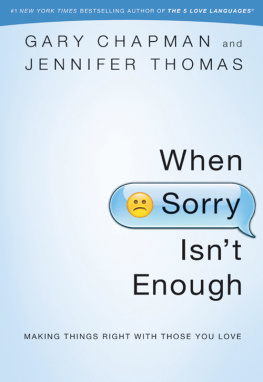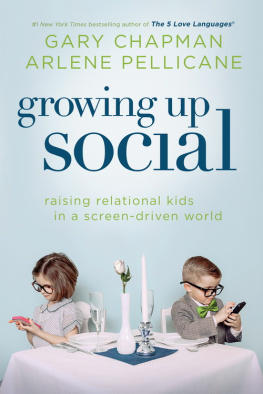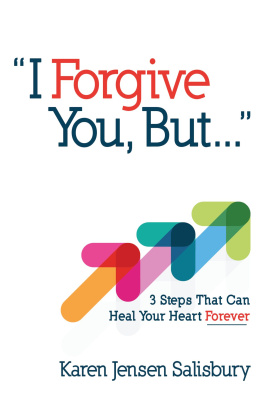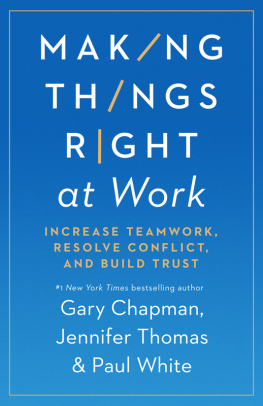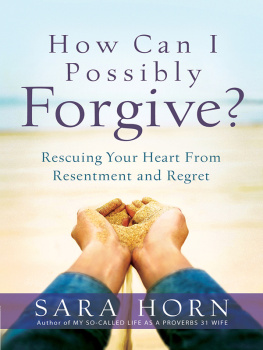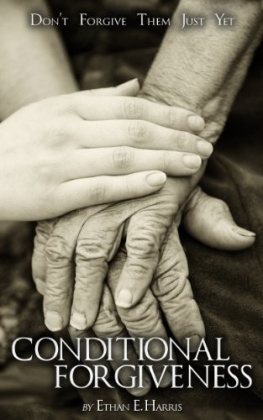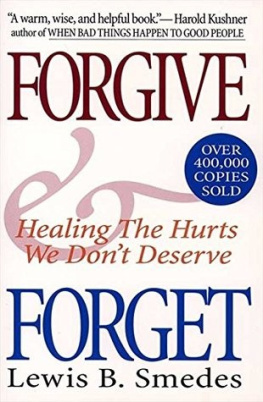
2013 by
GARY CHAPMAN
JENNIFER THOMAS
This book is a revised and updated edition of The Five Languages of Apology.
All rights reserved. No part of this book may be reproduced in any form without permission in writing from the publisher, except in the case of brief quotations embodied in critical articles or reviews.
All Scripture quotations, unless otherwise indicated, are taken from the Holy Bible, New International Version. NIV. Copyright 1973, 1978, 1984, 2011 by International Bible Society. Used by permission of Zondervan Publishing House. All rights reserved.
Scripture quotations marked NKJV are taken from the New King James Version. Copyright 1982 by Thomas Nelson, Inc. Used by permission. All rights reserved.
Edited by Elizabeth Cody Newenhuyse
Cover design: Faceout Studio
Cover image: Shutterstock #108629471
Interior design: Smartt Guys design
Author photos: P. S. Photography
Library of Congress Cataloging-In-Publication Data
Chapman, Gary D.
When Sorry Isnt Enough / Gary Chapman and Jennifer Thomas.
p. cm.
Includes bibliographical references.
ISBN-13: 978-0-8024-0704-7
1. Apologizing. I. Thomas, Jennifer, 1969- II. Title.
BF575.A75.C43 2006
158.2dc22
We hope you enjoy this book from Northfield Publishing. Our goal is to provide high-quality, thought-provoking books and products that connect truth to your real needs and challenges. For more information on other books and products written and produced from a biblical perspective, go to www.moodypublishers.com or write to:
Northfield Publishing
820 N. LaSalle Boulevard
Chicago, IL 60610
1 3 5 7 9 10 8 6 4 2
Printed in the United States of America
To Karolyn, who has accepted my apologies
and extended forgiveness
many times through our four decades
as husband and wife

To my parents, Jim and Frankie McCain,
thank you for the blessings of life and love
Contents
M y daughter is late over and over again, a woman said to me. Shes a wonderful young woman, but shes just habitually lateto our house for dinner, to church, you name it. It isnt a huge deal, but I wish just once she would say she was sorry.
Another woman Ill call Lisa said, I love my husband dearly, but Im tired of repeated apologies without behavior change, especially when it comes to chores. Dont just say Im sorry I forgot to mop the kitchen floor. Remember to do it!
Jack, fiftyish, is estranged from his brother because years ago his brother swindled him out of some money. Never has he told me he feels bad about what he did. I dont really care about the money, but I feel like he should make it right somehow, he said.
Michelle is recently divorced from her husband, Sam. However, she recognizes her part in the disintegration of their marriage and God is leading her to seek reconciliation: Deep down, I believe that God is saying it is worth it to pursue this often nontraveled road. These offenses range from annoying to life-shatteringbut in every case, a relationship needs mending. A wrong needs to be righted. Where do we start?
Sara was wondering the same thing when she came to one of my marriage seminars. Before the conference started, she came up to me and asked, Are you going to deal with the importance of apologizing?
Thats an interesting topic, I responded. Why do you ask?
Well, all my husband says is Im sorry. To me, thats not an apology.
So what do you want him to say or do? I asked.
I want him to admit that he is wrong and to ask me to forgive him. I also want him to assure me that it wont happen again.
Dr. Jennifer Thomas and I have conducted extensive research on the importance of apologizing effectively, and what we have learned has convinced us that Sara is not alone in her desire to deal with issues of admitting wrong and seeking forgiveness. Apology, however, is not a word that means the same thing to everyone. That is because we have different languages of apology.
I have seen this often in my counseling, Jennifer said. One spouse says, If he would only apologize, and the other says, I have apologized. So they get into an argument about what it means to apologize. Of course, they have different perceptions.
I have observed numerous couples in my office exhibiting similar behavior. It was obvious they were not connecting with each other. The supposed apology was not having the desired effect of forgiveness and reconciliation. I also remember occasions in my own marriage when Karolyn would apologize but I considered it rather weak, and other occasions when I would apologize, but shed have a hard time forgiving me because she felt that I was insincere.
We believe that going beyond a quick Im sorrylearning to apologize effectivelycan help rekindle love that has been dimmed by pain. We believe that when we all learn to apologizeand when we understand each others apology languagewe can trade in tired excuses for honesty, trust, and joy.
All of us are painfully aware of the conflict, division, anger, and strife in our world today, from Washington, DC, to the Mideast to the streets of our inner cities to seemingly safe New England villages. We will conclude, therefore, with a chapter that some may see as ethereal but we believe holds great potential: What would the world be like if we all learned to apologize effectively?
Join us as we explore what it means to be truly sorryand to move toward true forgiveness.
GARY CHAPMAN, PHD
JENNIFER THOMAS, PHD
I n a perfect world, there would be no need for apologies. But because the world is imperfect, we cannot survive without them. My academic background is the field of anthropology, the study of human culture. One of the clear conclusions of the anthropologist is that all people have a sense of morality: Some things are right, and some things are wrong. People are incurably moral. In psychology, it is often called the conscience. In theology, it may be referred to as the sense of ought or the imprint of the divine.
It is true that the standard by which the conscience condemns or affirms is influenced by the culture. For example, in Eskimo (or Inuit) culture, if one is on a trek and runs out of food, it is perfectly permissible to enter the igloo of a stranger and eat whatever is available. In most other Western cultures, to enter an unoccupied house would be considered breaking and entering, an offense punishable as a crime. Although the standard of right will differ from culture to culture and sometimes within cultures, all people have a sense of right and wrong.
When ones sense of right is violated, that person will experience anger. He or she will feel wronged and resentful at the person who has violated their trust. The wrongful act stands as a barrier between the two people, and the relationship is fractured. They cannot, even if they desired, live as though the wrong had not been committed. Jack, whose brother swindled him years ago, says, Things have never been the same between us. Whatever the offense, something inside the offended calls for justice. It is these human realities that serve as the basis of all judicial systems.
A CRY FOR RECONCILIATION
While justice may bring some sense of satisfaction to the offended person, justice does not typically restore relationships. If an employee who is found stealing from the company is caught, tried, and fined or imprisoned, everyone says, Justice has been served. But the company is not likely to restore the employee to the original place of leadership. On the other hand, if an employee steals from the company but quickly takes responsibility for the error, reports that misdeed to the supervisor, expresses sincere regret, offers to pay for all inequities, and pleads for mercy, there is the possibility that the employee will be allowed to continue with the company.

